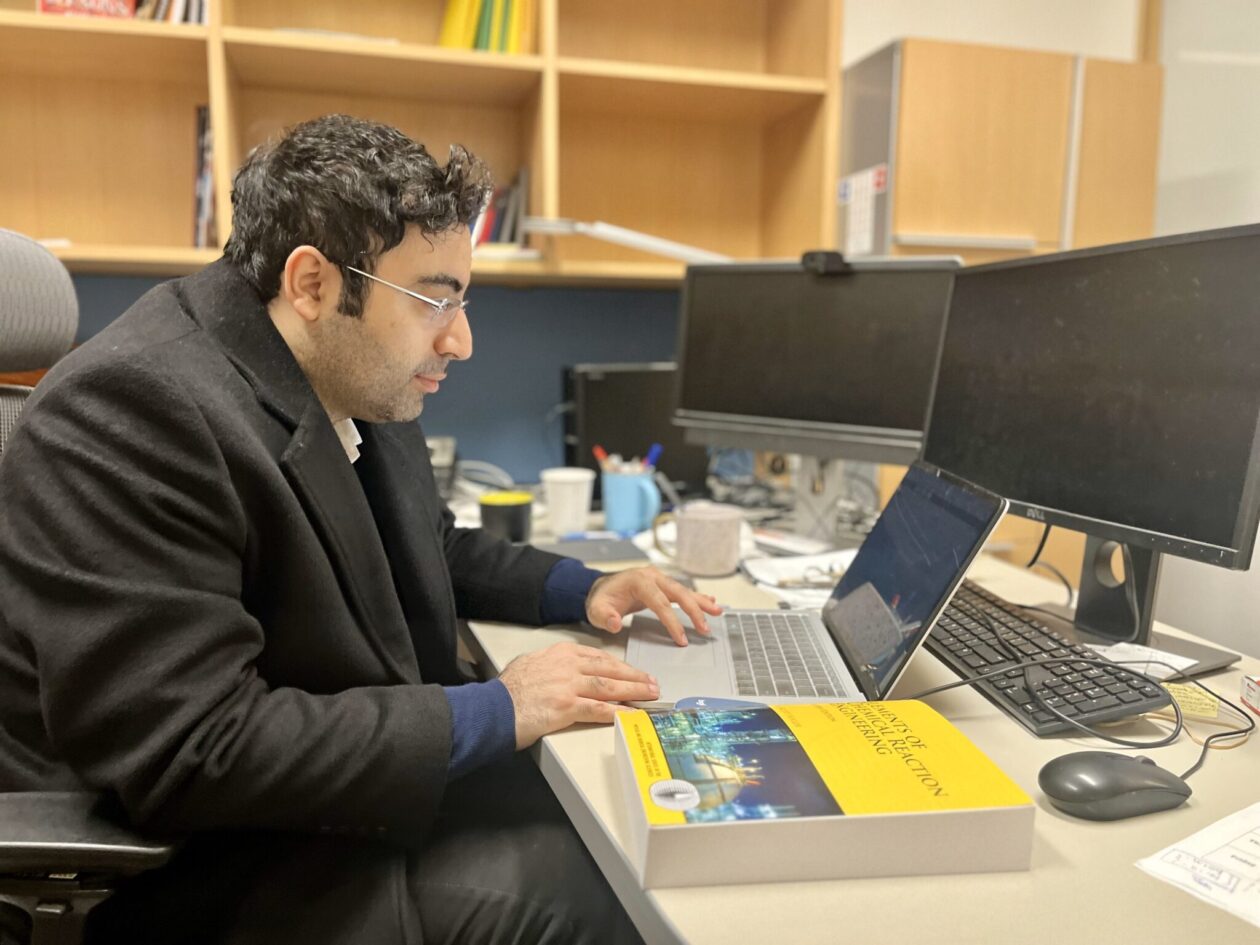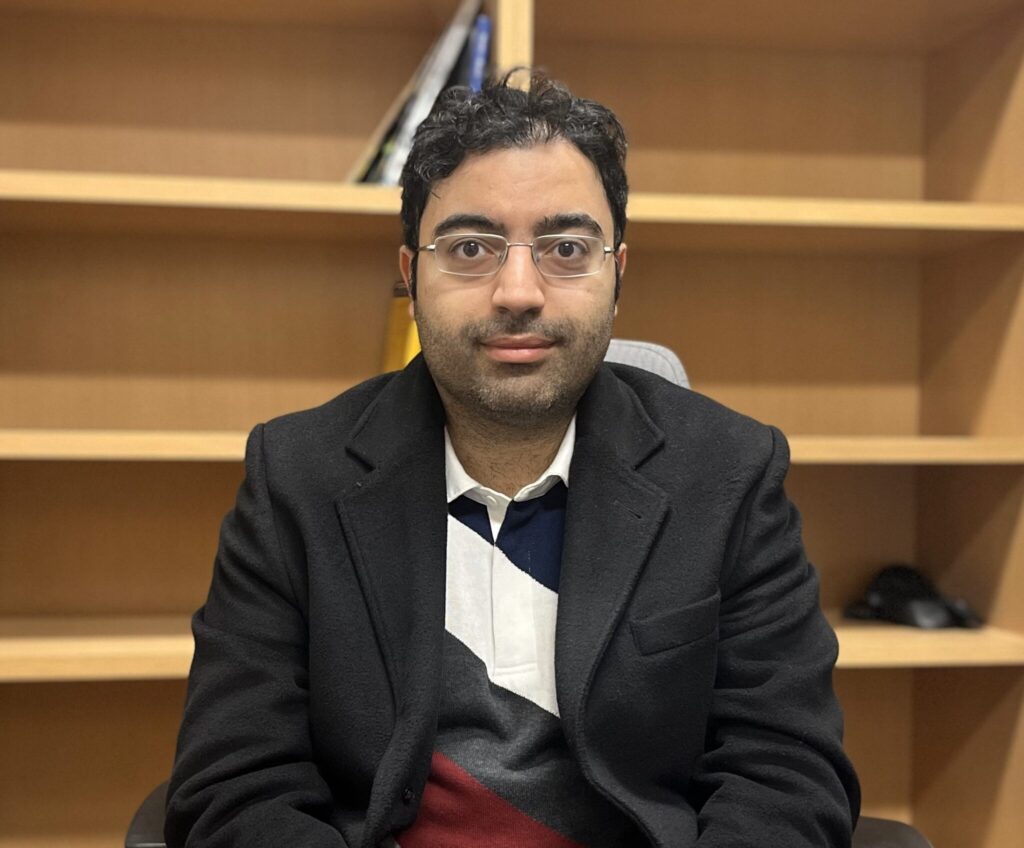Engineers Week: Q&A with Dr. Hossein Abedsoltan, assistant teaching professor of chemical engineering
Posted by Greg Edwards

Dr. Hossein Abedsoltan works in his office in Bertlesmeyer Hall. Photo by Greg Edwards/Missouri S&T.
Dr. Hossein Abedsoltan joined Missouri S&T in fall 2024 as an assistant teaching professor in the Linda and Bipin Doshi Department of Chemical and Biochemical Engineering. Here is a Q&A with Abedsoltan in commemoration of National Engineers Week 2025.
How would you describe what it means to be a chemical engineer?
Chemical engineering is a multidisciplinary field that applies principles of chemistry, physics, mathematics and engineering to develop processes and technologies that convert raw materials into valuable products. It involves designing, optimizing and scaling up chemical reactions and separation processes for industries such as energy, pharmaceuticals, materials and environmental sustainability. A chemical engineer not only ensures efficiency and safety in these processes but also drives innovation in areas like sustainable energy, recycling and advanced materials.
What aspects of your field do you find the most fascinating?
One of the most fascinating aspects of chemical engineering is its ability to address real-world challenges through innovation. My work in areas such as plastic waste recycling, process safety, and AI-driven chemical process optimization is particularly exciting because it merges fundamental science with cutting-edge technology. For example, using machine learning to predict greenhouse gas solubility in ionic liquids opens new possibilities for carbon capture, while designing catalysts for polymer recycling advances sustainability. Chemical engineering is a constantly evolving field that allows me to apply knowledge in a way that directly impacts industries and society.

One of your areas of expertise is paper engineering. How would you describe what this entails and why it is important?
Paper engineering focuses on the science and engineering behind the production, properties and applications of paper and fibrous materials. My research in this area, particularly on wetting behavior and absorption capacity of paper products, has practical implications for improving materials used in hygiene products, packaging and filtration. This work is important because paper-based materials are sustainable alternatives to plastics, and optimizing their absorbency, strength and recyclability can contribute to a more environmentally friendly industry.
The theme for National Engineers Week 2025 is “Design Your Future.” How does your work both as a researcher and as an assistant teaching professor fit with this theme?
This theme aligns perfectly with my role as both a researcher and an educator. As a researcher, I contribute to designing a more sustainable future by working on projects related to plastic waste recycling, process safety and applying sustainable materials for reducing global warming potential. My work helps industries transition to greener and safer processes.
As an assistant teaching professor, I play a key role in shaping the next generation of engineers. Through courses like Numerical Computing, Process Safety and Reactor Design, I help students develop critical problem-solving skills and equip them with knowledge that will allow them to design their own futures in industry, research or entrepreneurship.
By combining research with education, I ensure that both the present and future of chemical engineering continues to evolve toward sustainability and innovation.
What advice would you have for someone interested in pursuing this field?
Develop a strong foundation in chemistry, physics and mathematics. These are the pillars of chemical engineering, and mastering them will make advanced topics much easier.
Embrace problem-solving and critical thinking. Engineering is all about finding solutions to complex problems. Be curious and persistent.
Gain hands-on experience. Internships, research projects and lab work are invaluable for applying theoretical knowledge to real-world challenges.
Stay open to interdisciplinary learning. Chemical engineering intersects with AI, environmental science, materials engineering and business. Being adaptable and interdisciplinary will make you a more valuable engineer.
Network and seek mentorship. Engage with professors, industry professionals and peers. Attend conferences, join engineering societies and seek guidance from those with experience.
Be open to innovation and sustainability. The future of chemical engineering is moving toward green chemistry, carbon capture and recycling technologies. Staying informed about these trends will keep you at the forefront of the field.
Leave a Reply